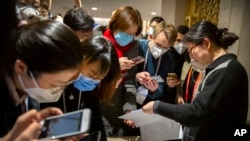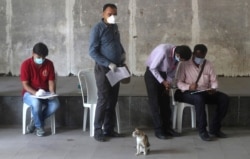The COVID-19 pandemic is exacerbating threats to press freedom globally, potentially undermining access to freely reported and reliable information for years to come, an international press freedom watchdog said Tuesday.
"We are entering a decisive decade for journalism linked to crises that affect its future," Christophe Deloire, head of Paris-based Reporters Without Borders (RSF), said in a statement.
The group's annual World Press Freedom Index, which ranks the situation for journalists in 180 countries and territories, showed few major changes from last year. Scandinavian countries top the list as most free, with repressive states such as China, Eritrea, Turkmenistan and North Korea at the bottom.
The index polls experts globally to assess conditions such as media independence, state- and self-censorship, legal frameworks and transparency. The worse the conditions, the higher the assigned score.
RSF described the coming decade as pivotal.
"The coronavirus pandemic illustrates the negative factors threatening the right to reliable information, with the pandemic itself an exacerbating factor," said Deloire. "What will freedom of information, pluralism and reliability look like in 2030? The answer to that question is being determined today."
Although the report accuses China and Iran — in 177th and 173rd place respectively — of censoring information about the coronavirus outbreak, it found that numerous governments exploited the crisis for political gain.
Iraq ranked worse than it did last year, slipping six spots to 162nd, after "authorities stripped Reuters of its license for three months after it published a story questioning official coronavirus figures."
"Even in Europe, Prime Minister Viktor Orbán of Hungary (down 2 at 89th), had a 'coronavirus' law passed with penalties of up to five years in prison for false information, a completely disproportionate and coercive measure," RSF said.
VOA has been tracking all COVID-19-linked censorship and press freedom violations.
The outbreak has allowed some governments to "take advantage of the fact people are stunned and mobilization has weakened to impose measures that would be impossible to adopt in normal times," Deloire told Agence France Presse.
A censorship campaign of online media showed that Turkey, the world's second-largest jailer of journalists, has become "more authoritarian than ever." Even then, the country rose three spots to 154th, largely because other countries fell in the rankings.
Russia, still in 149th place, is expanding its internet-control regime under President Vladimir Putin, recently introducing a "Sovereign Internet" law to disconnect the country from the world wide web. The report warned that Russia's censorship tactics are increasingly similar to those that have worked in China.
Russia has long denied censorship accusations, insisting its move toward a sovereign internet is a matter of national security.
China released a statement Tuesday rejecting the report, saying RSF "has always been biased against China," and that Beijing welcomes any foreign reporters who "adhere to laws and regulations."
Beijing expelled at least 13 journalists from three major outlets last month. The RSF report also said the coronavirus pandemic could have been averted or significantly lessened had the government allowed for uncensored reporting.
RSF said "the closure of the national internet" is already a reality in the isolated Central Asian state of Turkmenistan where the few internet users can access only a highly censored version of the internet, often in cafes where they have to show ID before connecting.
"Almost everywhere in Eastern Europe and Central Asia, strongmen are consolidating their grip on news and information," RSF warned.
The biggest improvement was Sudan, which rose 16 places to 159th after the removal of ex-President Omar al-Bashir. Benin showed the most backsliding, slipping 17 spots to 113th.
France lost two places to rank 34th with journalists in the country sometimes the victims of police violence at demonstrations, the report said.
The United States improved, moving three spots to 45th place.
"Arrests, physical assaults, public denigration and the harassment of journalists continued in 2019, though the numbers of journalists arrested and assaulted were slightly lower than the year prior," said the report.
"Much of that ire has come from President (Donald) Trump and his associates in the federal government, who have demonstrated the United States is no longer a champion of press freedom at home or abroad. This dangerous anti-press sentiment has trickled down to local governments, institutions and the American public."
RSF has published the index annually since 2002.
Some information is from AFP.







